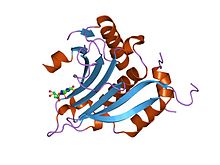In molecular biology, the eukaryotic translation initiation factor 4E family (eIF-4E) is a family of proteins that bind to the cap structure of eukaryotic cellular mRNAs.[1] Members of this family recognise and bind the 7-methyl-guanosine-containing (m7Gppp) cap during an early step in the initiation of protein synthesis and facilitate ribosome binding to an mRNA by inducing the unwinding of its secondary structures. A tryptophan in the central part of the sequence of human eIF-4E seems to be implicated in cap-binding.[2]
| IF4E | |||||||||
|---|---|---|---|---|---|---|---|---|---|
 cocrystal structure of eif4e/4e-bp1 peptide | |||||||||
| Identifiers | |||||||||
| Symbol | IF4E | ||||||||
| Pfam | PF01652 | ||||||||
| InterPro | IPR001040 | ||||||||
| PROSITE | PDOC00641 | ||||||||
| SCOP2 | 1ap8 / SCOPe / SUPFAM | ||||||||
| |||||||||
Members of this family include EIF4E, EIF4E2, EIF4E3 and EIF4E1B.
References
edit- ^ Thach RE (January 1992). "Cap recap: the involvement of eIF-4F in regulating gene expression". Cell. 68 (2): 177–180. doi:10.1016/0092-8674(92)90461-K. PMID 1733496. S2CID 46020706.
- ^ Ueda H, Iyo H, Doi M, Inoue M, Ishida T, Morioka H, Tanaka T, Nishikawa S, Uesugi S (March 1991). "Combination of Trp and Glu residues for recognition of mRNA cap structure. Analysis of m7G base recognition site of human cap binding protein (IF-4E) by site-directed mutagenesis". FEBS Lett. 280 (2): 207–10. doi:10.1016/0014-5793(91)80294-D. PMID 1672854. S2CID 11779841.
External links
edit- Eukaryotic Linear Motif resource motif class LIG_eIF4E_1
- Eukaryotic Linear Motif resource motif class LIG_eIF4E_2